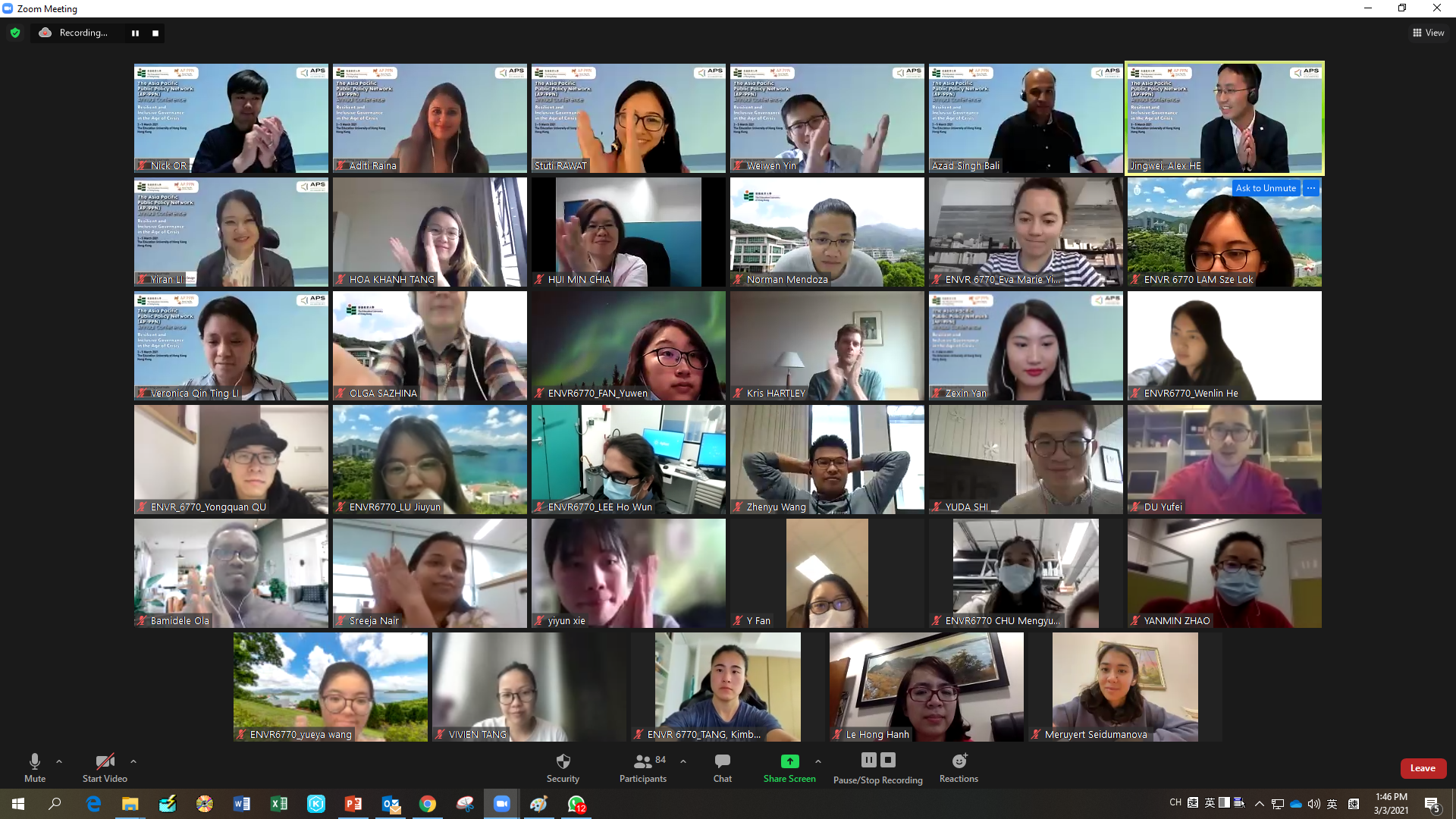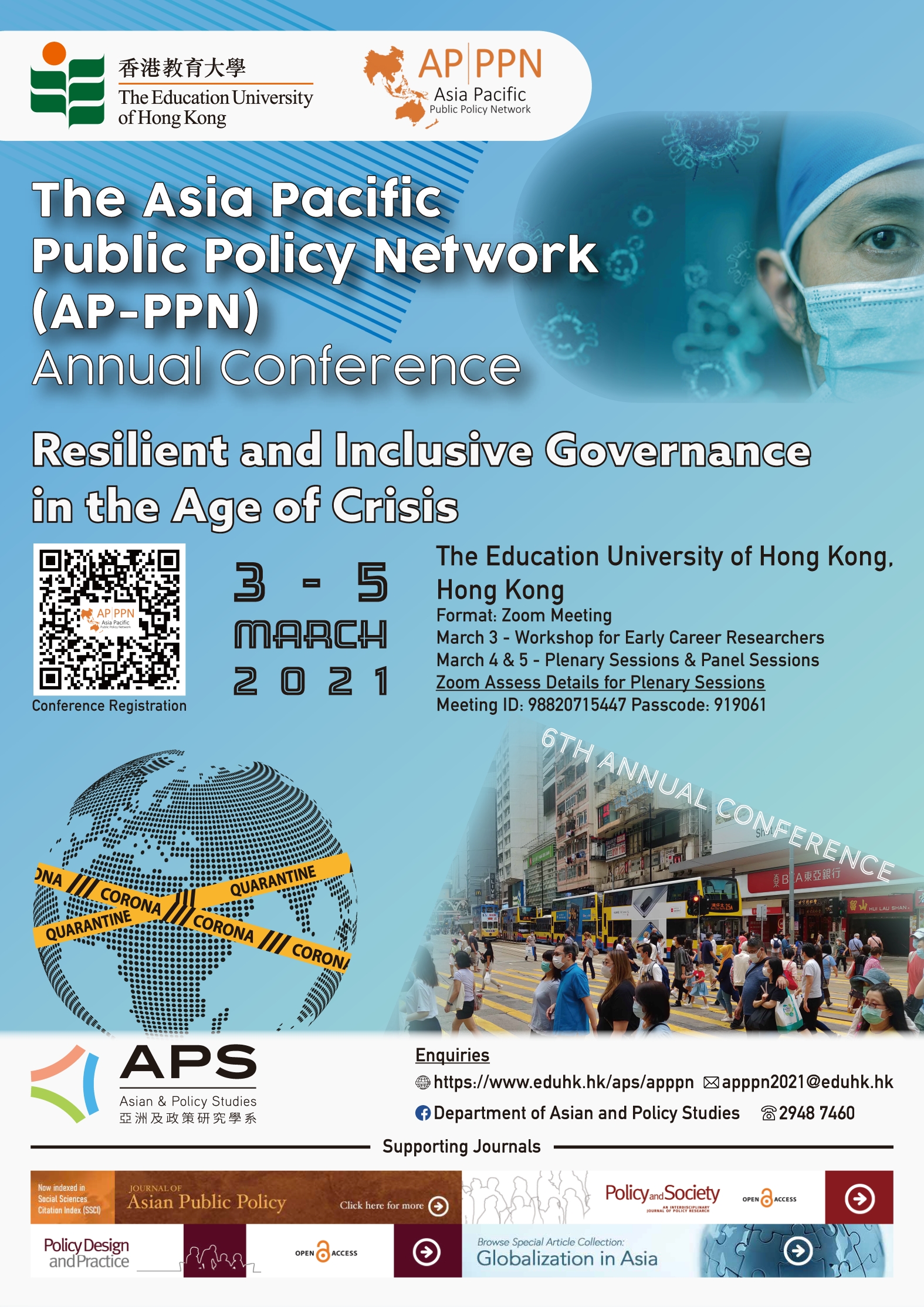6th Asia Pacific Public Policy Network (AP-PPN) Annual Conference

The Department of Asian and Policy Studies hosted the 6th Asia Pacific Public Policy Network (AP-PPN) Annual Conference from March 4-5, 2021 on the theme of ‘Resilient and Inclusive Governance in the Age of Crisis’. In light of the COVID-19 pandemic, the Conference was held remotely with over 334 attendees joining the sessions from Hong Kong, East Asia, South Asia, North America, Europe and South America.
As part of the Pre-Conference events, two workshops on topics especially relevant for Early Career Researchers were conducted on March 3, 2021. The first workshop was on “PhD Life and Post-PhD Employment”. Organised in the form of a roundtable, it featured recently graduated as well as senior academics and practitioners from The World Bank, Australian National University, City University of Hong Kong, The Education University of Hong Kong and The University of Macau. In a highly interactive and candid exchange, speakers spoke about their own struggles and experiences while undertaking their PhD and the route they followed towards post-PhD life. The second workshop was on “Converting Research into Publications” and featured academics with a prolific publishing record from the National University of Singapore, The Education University of Hong Kong, Hong Kong University of Science and Technology and King’s College London. Through an extremely frank and fruitful exchange, the speakers shared their tips, offered encouragement and answered questions posed by the audience. Both the workshops drew over 100 participants each and for the benefit of those that could not join the workshops but were keen to attend, a recording of these sessions has been made available on the Department’s YouTube Channel.
The Conference commenced on March 4, 2021, with an Opening Ceremony and Plenary Session which featured invited speakers – Raul Lejano, New York University; Wing Shan Kan, Caritas Institute of Higher Education; Michael Howlett, Simon Fraser University; Richard M. Walker, Edmund Cheng and Jiasheng Zhang, City University of Hong Kong and Anthony B. L. Cheung, Tai-lok Lui, Education University of Hong Kong. The plenary session talks focussed on topics directly related to the theme of the conference – the paradox of governance in the age of crisis, the importance of relationality in public policy and the formation of citizens’ extreme attitude positions.
The afternoon of March 4, 2021 was devoted to eight concurrent Panel Sessions that were divided into two rounds. These sessions were organised around topical issues – ‘Public Trust, Perception and Compliance Amidst Uncertainty’, ‘Digital Governance, Information and Communication’, ‘Governance in times of Crisis’, ‘Older Adults, Population and Ageing Policy’, ‘Other Themes of Governance and Public Administration’ and ‘Resilience’.
The second day of the Conference – March 5, 2021, began with Plenary Session Talks. These were delivered by Paulin Tay Straughan and Micah Tan, Singapore Management University; Xun Wu, Hong Kong University of Science and Technology; Giliberto Capano, University of Bologna and Kee Lee Chou, The Education University of Hong Kong. The Plenary Session talks focussed on the COVID-19 crisis through the lens of impact and intervention on older adults; and policy design and evidence-based policy making. The rich discussion among the panellists and between the attendees helped highlight important issues that policy-making still has to contend with in light of the pandemic and otherwise.
The afternoon of March 5, 2021 saw nine panel session organised in two rounds on ‘Assessing the Impact of the COVID-19 Pandemic’; ‘Health, Welfare and Social Policy’; ‘Smart Cities and Urban Policy’; ‘Education Sector in a Changing Landscape’, ‘Resilience’, ‘Environmental Policy and Regulation’ and ‘Community, Private Sector and Policy Responses to the COVID-19 Pandemic’.
The conference was a success not just in general but especially for one conducted remotely. Each of the two Plenary Sessions drew over 50 participants. Across the different Plenary and Panel sessions, a total of 49 papers were presented. Each of the four rounds of the panel sessions saw 80 participants attending. The high level of engagement in the Conference was a testament to the interest generated by the theme of the Conference and its relevance in current times.
















